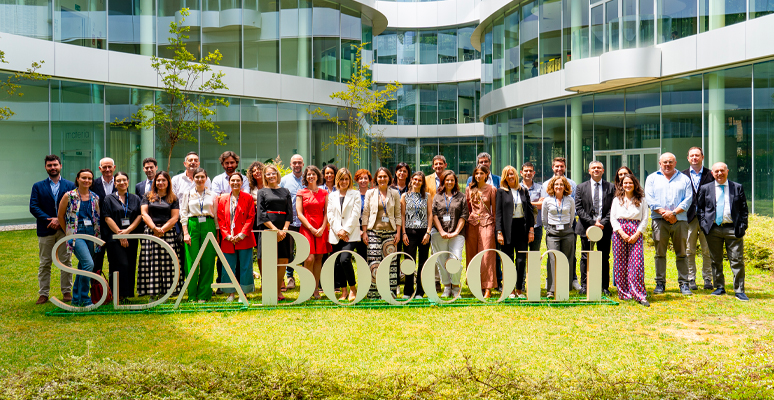Minister Zangrillo's directive for the measurement and evaluation of individual performance in the public sector, dated the 28th of November, has enlivened the debate by introducing 360-degree evaluation methods, quarterly feedback, calibration activities, as well as customized professional development paths. Although these demands may seem difficult to implement, evidence from international studies, to which SDA Bocconi also contributed, outlines the most functional implementation paths and identifies potentially less effective or even counterproductive practices. The conference was held at SDA Bocconi's headquarters and focused on these issues.
After an introduction to the plenary session given by Stefano Caselli, Dean of SDA Bocconi, Lorenzo Luciano, Knowledge Analyst in Public Management at SDA Bocconi, presented an analysis of evaluation systems in use across 11 European countries. "Analyzing the international trends, a trend emerges toward individual goal setting through negotiation rather than by top-down imposition, with a distinct focus on the importance of periodic feedback in all the countries examined," Luciano explained.
In this light, the Italian situation is undergoing an evolution. Until recently, it was characterized by a fragmented and decentralized approach to evaluation. However, today it is aligning with trends in the aforementioned European countries. There is a drive to introduce development-oriented evaluation and the adoption of 360-degree evaluation. The new directive confirms the adoption of cascading rationale in performance appraisal, encourages the use of feedback by providing, for example, quarterly performance interviews and self-assessment moments. On the subject of leadership, it draws on the framework of soft skills established by the decree of June 23, 2023.
In the conference, particular attention was devoted to 360-degree appraisal. This tool, focused on individual development, does not include incentives or sanctions, but aims to enhance dialogue and personal reflection through feedback from colleagues, subordinates, supervisors and stakeholders, both internal and external. "It is not a leadership assessment." Clarified Raffaella Saporito, Associate Professor of Practice of Government, Health, and Not-for-Profit at SDA Bocconi. It is a tool for observing oneself from the perspective of other people. And because of its distinct ability to produce detailed data, accurate interpretation of the results is essential."
Claudio Buongiorno, Fellow in Public Management at SDA Bocconi, continued the talk by highlighting how the directive seeks to fit into a process of improvement that has already begun in our country: "The intent is to provide us with a performance evaluation framework that is simple and sustainable from an administrative, economic and managerial point of view."
Giovanni Valotti, Full Professor in Public Management at SDA Bocconi, also wanted to highlight the positive assumptions behind the legislation. "Although merit, evaluation systems and training have been issues on the agenda of reforms and numerous measures for many years now, a clear invitation to go beyond compliance emerges with this directive, overcoming the limits of the bureaucratization of many of the innovations introduced in past years. At the very heart of the idea is the notion of investing in people, and the methodologies for doing so becoming the means and not the end. My invitation is to take your time to experiment, monitor the impact of the solutions and if necessary introduce correctives specific to your context, whether it is a small municipality with few employees or a large entity."
Regarding the skills needed for leadership in the public sector, Lavinia Lenzi, Fellow in Public Management at SDA Bocconi, presented the results of a research study that showed a prevalence of skills attributable primarily to more traditional leadership. "But not only that," Lenzi stressed, "we also recorded a predominance of competencies associated with emotional intelligence and diversity management and also a set of competencies in which the aspect of ethics represents a distinctive and peculiar element of public management."
On the topic of integrating performance appraisal and training pathways, Francesco Vidé, Lecturer in Public Management at SDA Bocconi outlined a strategic framework aimed at bridging the gap between the skills required and those offered. "In the next five years it is estimated that 44 percent of skills will become obsolete due to the impact of artificial intelligence on service and labor models. It is therefore crucial to intervene not only on the side of acquiring new skills and their evaluation, but also on selection, professional training, as well as on the staff development through outplacement opportunities and promotions."
To address the current needs of the performance appraisal system in Italy, Marta Micacchi, Researcher in Public Management at SDA Bocconi, outlined an innovative approach to formulating targeted training plans. "The analysis must start with the competencies, their expected level, and propose development actions calibrated on the individual person, setting the person specific goals to be achieved in a given time frame."
Giorgio Giacomelli, Associate Professor of Practice in Public Management at SDA Bocconi, emphasized the importance of communication as a tool to improve staff participation. One of the most relevant points of his talk was the effect of failure to communicate: "Let us remember that not giving feedback is itself feedback. When we do not use the tools we have to guide behavior, positive actions go unnoticed while negative ones appear as tolerated and thus risk being repeated."
In her final remarks at the conference, Marta Barbieri reminds us that the characteristics of an evaluation system, its complexity and the effort involved must be in line with its purpose and degree of personalization: "Four annual interviews are of no use if the system rests on the reversal of OU goals and there is no provision for the declination of behaviors into goals assigned to the individual employee.” Some steps, such as the 24-hour individual plan to be included in the PIAO, the interview and the 360° itself, lend themselves to a risk of bureaucratization "to be averted if we do not want to increase costs and bring home poor if not counterproductive results."
SDA Bocconi School of Management






